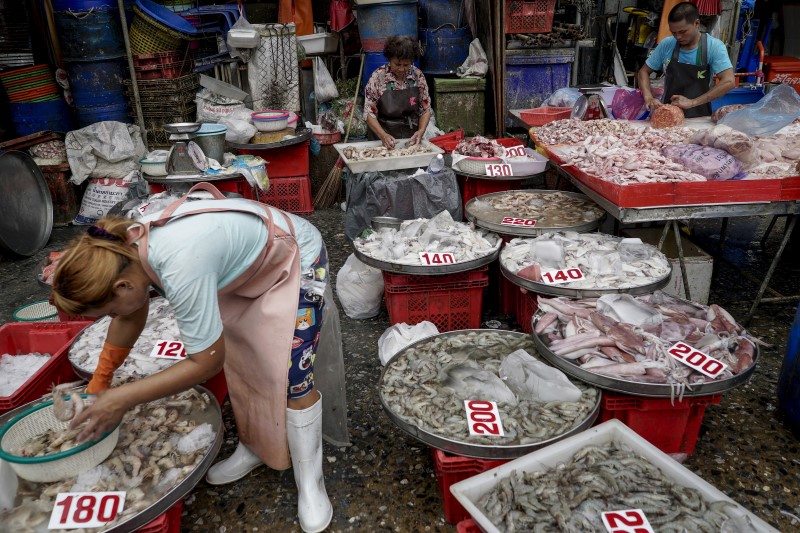Image: Vendors sort fish and other seafood at a market in Bangkok, Thailand, March 31, 2016. Picture taken March 31, 2016. REUTERS/Athit Perawongmetha
![]()
BANGKOK (Reuters) – The EU has not taken any decision on whether to ban fish exports from Thailand, the Thai foreign ministry said on Monday, clarifying comments made by its deputy prime minister that Bangkok had been given more time to end illegal fishing.
Earlier Deputy Prime Minister Prawit Wongsuwan had said the European Union had given Thailand, the world’s third-largest seafood exporter, a further six months to curb illegal, unregulated and unreported fishing, more than a year after Brussels threatened Bangkok with a ban.
The ministry said in a statement that Prawit had “merely stated” the EU had not reached a decision on whether to give Thailand a “red card”, effectively banning its fish exports.
“Thus Thailand still has time to work on this matter before such a decision will be made and Thailand reaffirms its commitment to continue working to tackle the problem,” it said.
Thailand’s fishing industry employs more than 300,000 people, many of them migrant workers from neighboring countries who are often subject to ill-treatment.
The industry’s reputation has been tarnished by instances of human trafficking to meet manpower demand, forced labor and violence.
The EU gave Thailand a “yellow card” – or warning – in April 2015 for failing to prevent illegal and unregulated fishing catch entering the supply chain and ending up in seafood exports to Europe. The warning required Thailand to clean up in six months or face a trade ban.
A spokesman for the European Commission confirmed that no formal decision had yet been taken and said the next round of talks would take place in Bangkok in July.
A Thai team visited Brussels last week to discuss progress. Since receiving the EU warning, Thailand has instigated new license and monitoring systems for fishing vessels, the director general of the Thai Fisheries Department, Adisorn Promthep, told Reuters last week in Brussels.
Bangkok has also tightened regulations and imposed limitations on the catch, Adisorn said.
The EU yellow card had been a “wakeup call” to deal with an obsolete fisheries law, he added.
Authorities were also making more regular checks on vessels and demanded employers give workers written contracts, he said. That was to prevent labor abuses and human traffickers selling people on to boats, Adisorn said.
(Reporting by Pracha Hariraksapitak in BANGKOK and Julia Fioretti in BRUSSELS; Writing by Simon Webb; Editing by Louise Ireland and Gareth Jones)
Copyright 2016 Thomson Reuters. Click for Restrictions.


